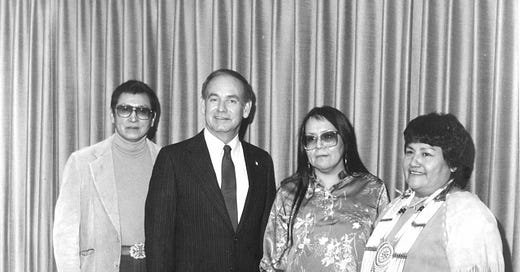March being Women’s History Month, now is an excellent time to learn about a hero named Maria Pearson—specifically about this one time she sat in a hallway. She was in her late thirties and this hallway was in Iowa. The year was 1971, and although the people walking down the hallway and gathering around Maria were probably wearing wing collars and bellbottoms, Maria was not. You see, Maria had another name, a name her mother had given her: Hai-Mecha Eunka, meaning “Running Moccasins”. And on this day, sitting in this hallway, Running Moccasins was wearing the traditional clothing of her people, the Turtle Clan of the Yankton Sioux.
The hallway itself was in front of the office of Robert D. Ray, Iowa’s governor at the time. Running Moccasins’ husband was an engineer with the Iowa Department of Transportation and he had told her about the graves unearthed during recent road construction. They contained the skeletal remains of twenty-six white settlers and an indigenous woman as well as her infant child. The remains of the twenty-six white settlers were quickly reburied, but the remains of the indigenous woman and her infant were not. Instead, they were taken to the office of the Iowa State Archaeologist.
This is what brought Running Moccasins to protest in front of Governor Ray’s office. And when Ray asked what he could do to help her, she responded, “You can give me back my people’s bones and you can quit digging them up.”
While an indigenous woman showing up to the governor’s office in traditional clothes may not seem like a big deal now, it sure was in 1971. Back then, it was illegal for all American indigenous people to practice their religions. Yes, the land of religious freedom wouldn’t allow that for its native peoples until seven years later with the American Indian Religious Freedom Act of 1978 (AIRFA). This is what Running Moccasins was up against, but it didn’t matter. She convinced Governor Ray and the remains of the indigenous woman and her infant were returned to where they were found.
Running Moccasins didn’t stop there. She organized tribal members and met with more state officials and five years after she sat in that hallway, the Iowa Burials Protection Act of 1976 was passed. The law specifically protected the graves of indigenous peoples and it was the very first of its kind in this country. Her momentum continued, a national movement grew and nearly a decade and a half later, the Native American Grave Protection and Repatriation Act of 1990 (NAGPRA) was signed into US law, providing the “protection and return of Native American human remains, funerary objects, sacred objects, and objects of cultural patrimony.”
Running Moccasins passed away in 2003 at the age of 70, leaving behind six children, 21 grandchildren, 15 great-grandchildren, two Nobel Peace Prize nominations and a world far better than how she found it.
Unfortunately, laws are only useful when they are enforced and the destruction of indigenous graves still continues. Most recently, last October the Biden Administration announced that it would be suspending NAGPRA in South Texas. Indigenous freedom of religion was eliminated as well, as the administration also suspended AIRFA. Alongside those, the Clean Air Act, Safe Drinking Water Act, Solid Waste Disposal Act, Endangered Species Act and twenty other laws were all suspended in South Texas by the Biden Administration in October of 2023. Why? What horrifying approaching apocalypse could possibly necessitate stripping that land and its 65,000 residents of all conceivable legal rights and protections? Migrants, or “illegals” as Biden referred to them during last week’s State of the Union Address. Yes, despite countless campaign promises that “not another foot” of Trump’s border wall would be built during his administration, Biden has not only continued building that wall, but is also allowing for untold destruction of land, air, water, animals, people and legacies along the way.
Like Leanne Betasamosake Simpson says in As We Have Always Done: Indigenous Freedom through Radical Resistance, “… settler colonialism will always define the issues with a solution that reentrenches its own power.”




